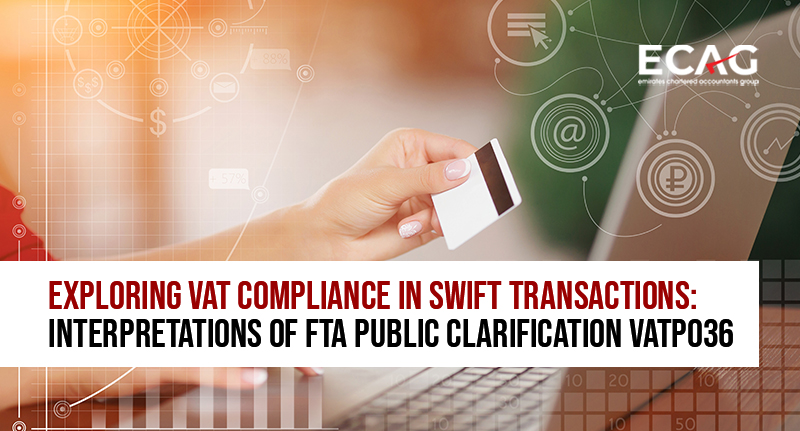
VAT Compliance Guideline for Financial Institutions Engaged in SWIFT Transactions
In the dynamic world of financial transactions, SWIFT (Society for Worldwide Interbank Financial Telecommunication) plays a pivotal role in facilitating secure and standardized communication between financial institutions globally. Recently, the Federal Tax Authority (FTA) has shed light on the VAT implications of SWIFT transactions through Public Clarification VATP036. In this blog post, we'll explore the guidance provided by the FTA and its impact on VAT compliance for financial institutions engaging in SWIFT transactions.
Understanding SWIFT Transactions:
SWIFT transactions are the lifeblood of international finance, enabling seamless communication and transactions between banks and financial institutions across borders. However, as with any financial service, VAT compliance becomes a critical consideration for institutions engaged in SWIFT communication.
Key Guidance from Public Clarification VATP036:
Recovery of Input Tax:
Financial institutions can now recover input tax on expenses related to taxable supplies, even when incurred through SWIFT communication with non-resident banks. This clarifies the VAT treatment of costs associated with SWIFT transactions, providing financial institutions with a clearer understanding of their recovery rights.
SWIFT as a Taxable Service:
The right to use SWIFT is deemed a taxable service, and if received by a UAE-resident institution, the place of supply is within the UAE. This categorization establishes a clear framework for VAT obligations related to SWIFT services, ensuring that financial institutions are aware of their responsibilities when engaging in such transactions.
VAT Obligations for Imported Services:
Financial institutions must fulfill VAT obligations when importing SWIFT services. This includes the issuance of tax invoices for taxable services, aligning with the broader VAT framework in the UAE. The clear guidelines provided by the FTA aim to enhance transparency and compliance in the financial sector.
Tax Invoices for SWIFT Transactions:
In cases where SWIFT transactions incur charges, financial institutions have the flexibility to issue tax invoices to themselves. This pragmatic approach recognizes the unique nature of financial services and streamlines the invoicing process for institutions engaged in numerous SWIFT-related activities.
SWIFT Messages as Evidence:
Acknowledging the challenge of issuing invoices for various SWIFT-related services, the FTA may accept SWIFT messages as evidence, provided essential information is included. This pragmatic stance ensures that the regulatory framework is adaptable to the specific challenges faced by financial institutions in documenting their transactions.
Public Clarification VATP036 marks a significant step forward in providing clarity on VAT compliance for financial institutions involved in SWIFT transactions. As the global financial landscape continues to evolve, adherence to these guidelines will be crucial for institutions seeking to navigate the complexities of VAT obligations while leveraging the efficiency of SWIFT communication. By understanding and implementing these guidelines, financial institutions can enhance their VAT compliance and contribute to a more transparent and robust financial ecosystem.




